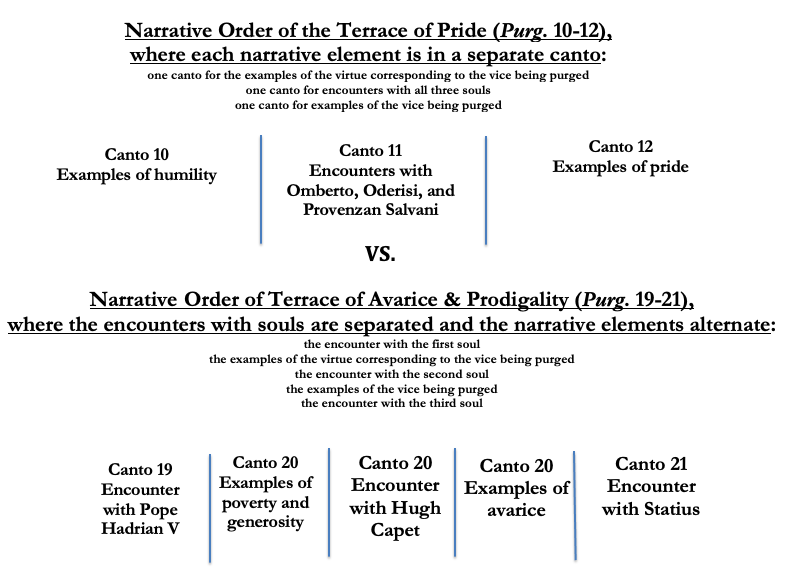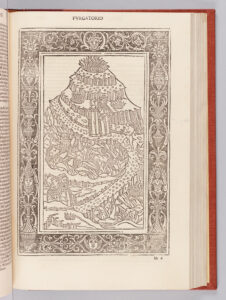Purgatorio 20 continues the treatment of the fifth terrace, devoted to avarice and prodigality. On this terrace, Dante presents a novel organizational structure. We recall that the template for the narrative building blocks of each of the seven terraces is as follows:

The first terrace, the terrace of pride, provides the template for these narrative elements: in treating the first terrace Dante organizes the narrative elements in the clearest and most straightforward fashion. The poet segregates the three basic building blocks (examples of the virtue opposed to the vice, encounters with souls, examples of the vice) into three different canti: the examples of humility are in Purgatorio 10, the encounters with souls are in Purgatorio 11, and the examples of pride are in Purgatorio 12. There are three encounters with three different souls in Purgatorio 11 (Omberto Aldobrandeschi, Oderisi da Gubbio, and Provenzan Salvani). The three encounters are kept together and in sequence, and are all in Purgatorio 11.
In contrast, when we reach the fifth terrace Dante changes his narrative organization, making it much more complex. As on the terrace of pride, he features encounters with three souls. But here he breaks up the encounters with the three souls (Hadrian V, Hugh Capet, Statius) into three separate encounters, which he then interlaces with the examples of virtue and vice. We can see the basic organization of the first terrace contrasted with the complex intercalatory organization of the fifth terrace in this chart:
For a similar intercalatory technique, see Purgatorio 8, where Dante breaks up the the ritual performance of the snake entering the Valley of the Princes into two segments, which he then interweaves with the encounters with Nino Visconti and Currado Malaspina.
Purgatorio 20 features the very she-wolf that in Inferno 1 prevented Dante from reaching the mountain bathed in sunlight and necessitated his trip to the otherworld. Here the narrator hurls an imprecation on the lupa, cursing her:
Maladetta sie tu, antica lupa, che più che tutte l’altre bestie hai preda per la tua fame sanza fine cupa! (Purg. 20.10-12)
May you be damned, o ancient wolf, whose power can claim more prey than all the other beasts— your hungering is deep and never-ending!
As in Inferno 1, the lupa here is characterized in terms of never-ending “hunger”: greed that can never be placated, never be satisfied. In Purgatorio 20 we are in a position to see what we could not see as clearly in Inferno 1, namely that the lupa is a composite of all negative desire, all cupiditas.
In chapter 5 of The Undivine Comedy I lay out the case for Dante’s conflation of different forms of desire in the upper terraces. I subsequently developed the argument further in the essay “Guittone’s Ora parrà, Dante’s Doglia mi reca, and the Commedia’s Anatomy of Desire,” where I note the conflation of Ulysses and the she-wolf into a mature ideology of desire. This mature ideology differs from that of the Convivio in blurring the treatise’s sharp distinction between material and intellectual cupidity. Now material and intellectual cupidity are conflated:
Dante’s mature conviction that the desire for knowledge can become immoderate in ways that render it not so different from other forms of immoderate desire leads him to invoke Ulysses at the threshold of the sins of incontinence, in Purgatorio 19, in the first half of a canto whose second half is devoted precisely to avarice, whose ledge the travelers have reached. Indeed, the linking of material and intellectual cupidity is further highlighted by the juxtaposition of Ulysses, in Purgatorio 19, and the she-wolf, cursed in Purgatorio 20 in the same language used for the avaro maladetto of the canzone Doglia mi reca: “Maladetta sie tu, antica lupa” (Cursed be you, ancient wolf [Purg. 20.10]). (“Guittone’s Ora parrà, Dante’s Doglia mi reca, and the Commedia’s Anatomy of Desire,” p. 67)
I end the essay cited above by positing that “Dante’s last great figural node for excess desire is la lupa/Ulysses” (p. 69). The juxtaposing of the lupa of Purgatorio 20 with the serena of Purgatorio 19 testifies to Dante’s willful braiding together of different strands of concupiscence, different kinds of “hunger”: spiritual and physical craving interwoven in a tight skein of misleading and misplaced desire.
We remember that in Purgatorio 19 Dante encounters the soul of a pope, Adrian V, who speaks of his former avarice as an overweening ambition to reach the highest rung on the ladder of temporal power and ambition, the papacy.
In Purgatorio 20 the purview of avarice again includes great power and status. Moving from the highest rung of the ecclesiastical ladder to the highest rung of secular power, the canto takes aim at the French ruling dynasty.
The specter of avarice that haunts the highest echelons of spiritual life is thus revealed to have corrupted the highest echelons of temporal life as well. Purgatorio 20 condemns the French royal family, root and branch, not just as individual “Filippi e Luigi” (verse 50) but as a dynasty:
Chiamato fui di là Ugo Ciappetta; di me son nati i Filippi e i Luigi per cui novellamente è Francia retta. (Purg. 20.49-51)
The name I bore beyond was Hugh Capet: of me were born the Louises and Philips by whom France has been ruled most recently.
The topic of heredity was discussed vis-à-vis the princes in the Valley of Purgatorio 8, where Dante made the strong statement that virtue cannot be passed from father to son, but is infused by God. And yet vice seems to have been passed from father to son quite handily in the case of French royalty. In fact, Hugh Capet uses the metaphor of a tree — a metaphor that is redolent of genealogy — to characterize himself as the root of the “evil plant” that “overshadows” all the Christian lands:
Io fui radice de la mala pianta che la terra cristiana tutta aduggia, sì che buon frutto rado se ne schianta. (Purg. 20.43-45)
I was the root of the obnoxious plant that overshadows all the Christian lands, so that fine fruit can rarely rise from them.
Interestingly, in Dante’s analysis, the turn toward evil came with the temptations of “the giant dowry of Provence” (“la gran dota provenzale” [61]):
Mentre che la gran dota provenzale al sangue mio non tolse la vergogna, poco valea, ma pur non facea male. (Purg. 20.61-63)
Until the giant dowry of Provence removed all sense of shame within my house, my line was not worth much, but did no wrong.
This reference to a literal dowry — most likely the one that accompanied Beatrice, daughter of Ramon Berenguer IV count of Provence, when she married Charles I of Anjou in 1245 — reminds us of the similarly noxious effects of the metaphorical “dowry” that Pope Sylvester gave to Constantine and all subsequent popes (see Inferno 19): the Donation of Constantine. Great earthly goods corrupt.
Purgatorio 20 is dense with history. A notorious historical issue in this canto is Dante’s charge that the French King Philip the Fair (Filippo il Bello) is responsible for the murder of Pope Boniface VIII.
Dante engages in savage attacks on Boniface VIII in the Inferno: in Inferno 6, Boniface is likely the pope who pretends to play both political sides in Florence, thus allowing the Blacks to come to power; in Inferno 19 Dante finds a way to damn Boniface to the bolgia of simony although he was still alive in 1300; in Inferno 27 Dante makes Boniface a key player in the moral drama of Guido da Montefeltro.
Nonetheless, Dante does not exculpate the French monarch for his responsibility in the murder of the Pope. Boniface VIII was the vicar of Christ (Purg. 20.87), and Dante holds Philip responsible for an action that is tantamount to an attack on Christ himself.
The canto includes lots of history that has never been “excavated” by critics, thickly layered into terzina after terzina. Thus, Pieter Vanhove was able to write a beautiful paper on the Battle of Golden Spurs, submerged in the “thick textuality” of Purgatorio 20.46-48.
It is interesting to consider that Dante’s attack on the French monarchy stresses genealogy and the passing of sovereignty over France from one ruler to the next over many centuries. Although Dante libels the founder of the Capetian dynasty as the son of a butcher in Paris (Purg. 20.52), his sense of a dynasty that extends from 987, when Hugh’s son became King of France, to the present time, is palpable.
I wonder if Dante’s scorn and dislike for the French royal house is tinged with a foreboding sense of the history that would unfold over the successive centuries. The French dynasty, for all its corruption, led to a unified nation-state — in other words, to everything that Italy did not achieve. Was Dante’s intense scorn for the current rulers of France as expressed in Purgatorio 20 in some way connected to an insight that the French had achieved what Italy had not achieved? After all, unity is the highest of political values for Dante. Italy is “serva Italia” — “abject Italy” in Purgatorio 6.76 — because Italy was ruled by many warring dynasties and factions that were unable to found a unified nation.
Purgatorio 20 is framed by avarice in its most crushing form: the apostrophe to the maladetta lupa in verses 10-12 leads to the apostrophe to avarizia in verses 82-84. Apostrophe is a rhetorical trope that we associate with Dante’s most intense political invectives (for instance, in Inferno 19 and Purgatorio 6); we note here the presence of other rhetorical tropes that we have seen in similar invectives, such as anaphora and the use of sarcasm.
At the end of Purgatorio 20 there is an earthquake that is the prelude to the next episode: an extraordinary episode that spans Purgatorio 21 and 22.


 Return to top
Return to top